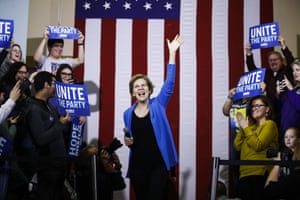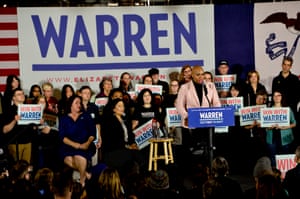US elections 2020
Warren sought to cast herself as uniquely positioned to unite the party in her final appeal to Iowans this weekend

Photograph: Matt Rourke/AP
Hours after the Senate impeachment trial of Donald Trump adjourned for the evening in Washington on Friday, Elizabeth Warren bounded into a brewery in downtown Des Moines, Iowa.
The Massachusetts senator and Democratic presidential candidate, displaying the energy of Bailey, her golden retriever and the breakout star of her campaign, hopped on top of a box and greeted the room, which was so packed the wait staff had to ask guests to pass their pint glasses to the bar to be refilled because they couldn’t bus the tables and had run out of fresh ones.
Warren had missed an earlier campaign rally across the street because of the impeachment proceedings, and thanked her supporters for turning out. And then she turned to thank her campaign co-chairs who have stepped in for Warren in her absence: congresswomen Deb Haaland of New Mexico, Katie Porter of California and Ayanna Pressley of Massachusetts, who were all part of a wave of the record of women elected in the 2018 midterm elections.
“You know what I love best about them? Warren said on Friday night, pointing to the members of Congress. “They prove that kickass women win.”
In the final days before the Iowa caucuses, Warren is explicitly confronting concerns among some voters about nominating another woman to take on Donald Trump in November. And for anyone still haunted by Hillary Clinton’s defeat in 2016, the three women by Warren’s side serve as a reminder of what has changed.
“Women have been doing very well since Donald Trump has been elected,” Warren told supporters in a tele-town hall earlier this week. “2020 is not 2016.”
The sharp focus on relieving any lingering doubts about her electability reflects the overwhelming desire by Democrats in Iowa and around the country to unseat a president they view as a singular threat. That fear has reshaped the primary debate this cycle, sharpening the focus on who is best positioned to win in the November presidential election, a calculation that often works against women and minority candidates.
While support for Warren has dipped in the last few months, she has one of the largest and most organized political operations in Iowa, which could prove decisive on Monday night. Recent surveys of Iowa show no clear frontrunner and a large number of caucus-goers still undecided.

Squeezed between Vermont senator Bernie Sanders, who has consolidated support on the left in recent months, and former vice-president Joe Biden, who has remained the top choice of moderate candidates, Warren is now making an explicit case for why Iowans should turn to her on Monday night.
“We’re down in the final strokes, but understand, we will, we must come together as a party and beat Donald Trump,” Warren told hundreds of supporters at a gymnasium in Cedar Rapids on Saturday. “And I’ve got a plan for that.”
In her final appeal to Iowans this weekend, Warren sought to cast herself as uniquely positioned to unite the party. Allies championed her as a consensus-candidate who can excite Democratic base voters without alienating either ideological flank. A recent Quinnipiac University poll found that Warren is the top second choice of Democratic primary voters nationally, a position that could matter in Monday’s caucuses where a second round of balloting is required.
At rallies and events, the senator was introduced by speakers who caucused for Bernie Sanders and Clinton in 2016 as well as by speakers who initially endorsed presidential candidates no longer in the race, including Cory Booker and Kamala Harris. A new advert released by her campaign features a man from rural Iowa who supported Trump in 2016 insisting that Warren can absolutely defeat the president.
“For people that say that a woman can’t win, I say: nonsense,” he says. “I believe a woman can beat Trump and I believe Elizabeth is that woman.”
“I’ve talked a lot about how empathetic she is but let me give you another ‘e’ word,” Pressley said at a rally in Iowa City. “She’s electable too.”
Supporters in Iowa say they like that she has detailed plans. They remark upon her grasp of policy and a can-do attitude. Many women are drawn to her personal story. Betty Wells, who plans to caucus for Warren in Ames, said she too grew up in a working class family in Oklahoma.
“I’m an Okie,” she said clutching her hands to her heart. “Her story is my story.”
Dan O’Brien, a caucusgoer in Cedar Rapids, says Warren is the “opposite of Trump”. “She is a uniter,” he said, adding that he likes her “intellect” and “positive energy”.
His wife, Carol O’Brien, is drawn to Warren’s policy platform, and specifically her plan to overhaul America’s healthcare system.
“Some of the candidates want to nibble around the edges,” she said. “I don’t think that’s a strategy that will move the healthcare system to true affordability.”
Warren has proposed a version of Medicare for All that would eliminate private insurance and transition to a government-run healthcare system after three years. The plan drew criticism from progressives who were opposed to the transition phase, and from moderates who believe Medicare for All will hurt Democrats in a general election. Following the attacks on her healthcare position, polls showed her standing slip behind Sanders.
“I was leaning toward Elizabeth Warren in the spring but then she came up with this extreme idea on healthcare and I gave up on her,” said Phillip Cantrell, a retired maintenance worker from Fruitland Iowa, who attended a Biden campaign event in Muscatine this week. He is considering supporting Minnesota senator Amy Klobuchar.
Tom Huber, 72, attended a Warren rally in Iowa City on Saturday as he tries to decide among Biden, Buttigieg and Klobuchar.
“Warren’s a little liberal for me,” he said. “I’m more middle of the road, which is why the other three are more middle of the road. But I like her in terms of her person and what she’s done for her career, so we’ll see what happens.”
Porter, a native Iowan who now represents a suburban California district that hasn’t voted for a Democrat since the 1930s, argued that Warren can appeal to a wide demographic.
“I represent a Republican district,” she told a crowd on Friday night, “And I am all in for Elizabeth Warren.”
At Peace Tree Brewing on Friday night, Shireen Carter, an attorney in Norwalk, was among the hundreds of people who waited in Warren’s now-famous selfie line. But she also had something to show the senator: a one-page summary of her student loan debts from law school.
As of that evening, she owed $280,075.58.
“She gave me a big hug and said that we were going to fix that in nine months,” Carter said after the exchange with Warren, who has a plan to forgive most student loan debt. “I hope that voters give her the opportunity to do that.”
Additional reporting by Joan E Greve in Iowa City
Source: Elections - theguardian.com




